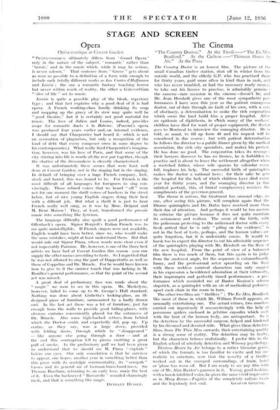The Cinema
"The Country Doctor." At the Tivoli—" The Ex-Mrs. Bradford." At the Carlton—"Thirteen Hours by Air." At the Plaza The Country Doctor is an honest film. The picture of the small Canadian timber station, shut off in winter from the outside world, and the elderly G.P. who has practised there for thirty years, paid more often in kind than in cash, and who has never troubled, or had the necessary ready money, to take out his licence to practise, is admirably genuine : the camera—rare occasion in the cinema—doesn't lie, and Mr. Jean Hersholt gives one of the most sympathetic per- formances I have seen this year as the patient courageoas doctor, out of date through no fault of his own, with a core of obstinacy, a determination to make the rich corporation which owns the land build him a proper hospital. After an epidemic of diphtheria, in which many of the workers' children have died for want of proper equipment, the doctor goes to Montreal to interview the managing director. He is
told, as usual, to fill up form 48 and his request will be considered in due course ; but .with patient determination
he follows the director to a public dinner given by the medical association, the rich city specialists, and makes his protest. He has done no good. The corporation takes its revenge ;
their lawyers discover he has no licence, he is forbidden to practise and is -about to leave the settlement altogether when a wretched father, whose wife spawns by calendar every
fall, implores his help. The successful birth of quintuplets makes the doctor a national hero ; for their sake he gets the hospital for the lack of which children have died every year for thirty years, and the managing director (a line satirical portrait, this, of brutal complacency) receives the compliments of the governor-general.
The theme is serious, the treatment has unusual edge, no one, after seeing this picture, will complain again that the Dionne quintuplets and Dr. Dafoe have received more than their due of attention. And perhaps it would be too austere to criticise the picture because it does not quite maintain its seriousness and realism. The scene of the birth, with the policeman protesting to the unlicensed doctor with every fresh arrival that lie is only " piling on the evidence," is not in the best of taste, perhaps, and the human values are quite forgotten, but it is undeniably comic. It would be harsh too to expect the director to cut his admirable sequence of the quintuplets playing with Mr. Hersholt on the floor of the new hospital. From the point of view of a balanced film there is too much of them, but this again is to judge from the austerest angle, for the sequence is extraordinarily funny, and the professional actor sprawling on the floor with these reckless carnival characters can only suggc't in his expression a bewildered admiration at their virtuosity, their impromptu and perfectly timed performance : a per- formance which reminded me of Buster Keaton's solemn slapstick, as a quintuplet with an air of methodical pedantry upset each chair in the room in turn.
The other two films are " thrillers " : The Ex-Mrs. Bradford, like most of those in which Mr. Powell appears, an unusually entertaining one. The actual crimes, two murders carried out ingeniously if unconvincingly with the help of poisonous spiders enclosed in gelatine capsules which melt with the heat of the human body, are unimportant. So is the detection by the successful surgeon, helped and hindered by his divorced and devoted wife. What gives these detective films, front The Thin Man onwards, their entertaining quality is a strong sense of reality. The detection may be faulty, but the characters behave realistically. I prefer this to the English school of scholarly detection and Wimsey psychology.
Thirteen Hours by Air belongs to a rather tiresome genre, of which the formula is too -familiar to excite and too un- realistic to entertain, now that the novelty of a thriller worked out in the cramped surroundings of train, hotel or 'plane has worn off. But I am ready to see any film with one of Mr. Alan Baxter's gunmen in it. Young, good-looking. with a harsh inhibited voice, lie gives the same vivid impression as in Mary Burns—Fugitive of the completely callous brain






















































 Previous page
Previous page